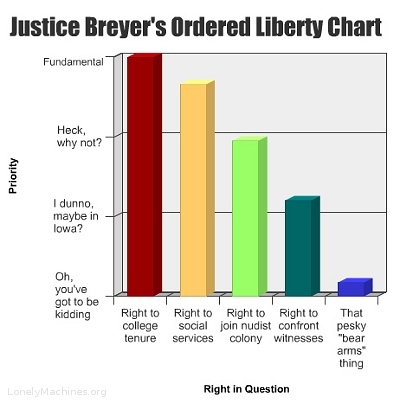Bartholomew Roberts
Moderator
On the eve of oral arguments in McDonald, the Volokh Conspiracy has a number of interesting posts relating to the case:
Randy Barnett examines an argument that the 14th does not incorporate the Bill of Rights from another well-respected colleague and responds to it by discussing Justice Taney's conclusions in Dred Scott.
Meanwhile Dave Kopel has an interesting piece on why U.S. vs. Miller was so badly written which draws on personal biographies of Justice McReynolds by his clerks. Suffice it to say that Justice McReynolds does not appear to have been a likable man, despite his disdain for FDR's New Deal.
Meanwhile over at Reason.com, Damon Root highlights some of the economic liberties that libertarians hope to restore via a P&I win in McDonald and he also gives a nice reply to Akhil Amar of Yale Law's assertion that P&I could support a right to health care by way of Frederick Douglass.
All of these articles are useful reading that will help inform you on tomorrow's oral arguments better and most of them are quite short as well.
Also worth noting, the Supreme Court offers transcripts of oral arguments posted on their websites the same day as the argument is held:
http://www.supremecourtus.gov/oral_arguments/argument_transcripts.html
In addition, SCOTUSblog (which is sponsored by Akin-Gump, one of the firms that defended Washington D.C.'s gun ban in Heller) will be blogging the oral arguments tomorrow.
Randy Barnett examines an argument that the 14th does not incorporate the Bill of Rights from another well-respected colleague and responds to it by discussing Justice Taney's conclusions in Dred Scott.
Meanwhile Dave Kopel has an interesting piece on why U.S. vs. Miller was so badly written which draws on personal biographies of Justice McReynolds by his clerks. Suffice it to say that Justice McReynolds does not appear to have been a likable man, despite his disdain for FDR's New Deal.
Meanwhile over at Reason.com, Damon Root highlights some of the economic liberties that libertarians hope to restore via a P&I win in McDonald and he also gives a nice reply to Akhil Amar of Yale Law's assertion that P&I could support a right to health care by way of Frederick Douglass.
All of these articles are useful reading that will help inform you on tomorrow's oral arguments better and most of them are quite short as well.
Also worth noting, the Supreme Court offers transcripts of oral arguments posted on their websites the same day as the argument is held:
http://www.supremecourtus.gov/oral_arguments/argument_transcripts.html
In addition, SCOTUSblog (which is sponsored by Akin-Gump, one of the firms that defended Washington D.C.'s gun ban in Heller) will be blogging the oral arguments tomorrow.
Last edited:

